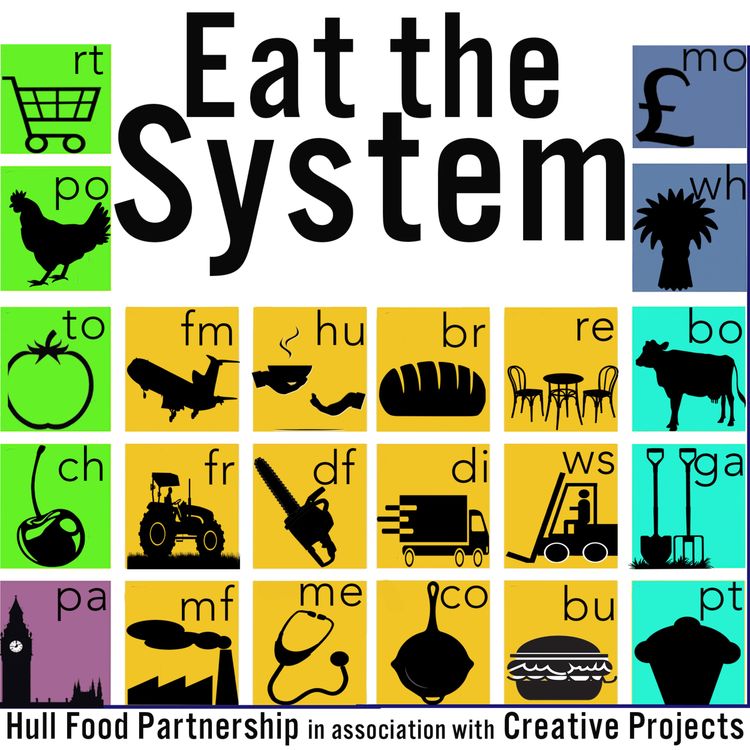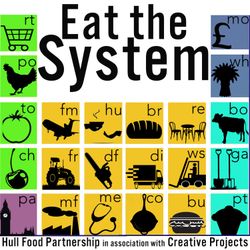Share

Eat the System
Community Growing spaces; and the Postcode Gardener Project
Ep. 8
•
Community growing is a two handed endeavour, on the one hand you need to know how to care for your brassicas, and on the other you need to nurture the community. John Pickles has both skillsets in spades.
In this episode we talk about managing a community allotment, and an exciting new project funded by Friends of the Earth, which will see community led rewilding in several neighbourhoods, including two in Hull.
More episodes
View all episodes

22. Food Justice and Food Oppression in the USA
32:23||Ep. 22Once again in this episode, we will be crossing the pond. Andrea Freeman is an American academic and author. Her book "Ruin their Crops on the Ground" relates the history, and current state, of the US food system; especially how it affects marginalised communities. It is a story that is, at best rife with ignorance, and at worst, fraught with deliberate harm.You can purchase Andrea's book from herehttps://www.rarewaves.com/products/9781250871039-ruin-their-crops-on-the-groundor from their Ebay Store.
21. From School Dinners to the School Curriculum: The Role of Food in the School System
21:53||Ep. 21This months episode is a sort of epilogue to last month's. After the metaphorical tape stopped rolling the conversation, between me an Janie continued - much of it on a topic dear to both our hearts, the role food in the school school system - from school dinners to the school curriculum.Because this wasn't intended for the podcast you'll hear a lot more from me than usual, along with some insights into how the podcast is made.Find out more about Incredible Edible Lambeth, and watch the film that Janie mentions, here https://www.incredibleediblelambeth.org/
20. OxFarmToFork
23:46||Ep. 20If I was to try and describe the perfect food procurement supply chain it would go something like this:short, transparent, fair and sustainable.well in this month's episode Janie Bickersteth from Oxfarm to Fork tell us about an initative that hits all these points and some.
19. Elspeth Hay - Feed us with Trees
35:45||Ep. 19A month or so ago a US publisher emailed to ask if I'd like to interview Elspeth Hay, about her recently published book about harvesting nuts., called 'Feed us with Trees' Obviously I agreed, I love talking to anyone about food . But what I didn't expect was how profoundly reading the book would both change and clarify my outlook. From how traditional hunter-gathering societies managed the land, to how trees could and should play a major role in modern agriculture, prepare to discover a missing piece of the modern food system.You can download a copy of the book from herehttps://newsociety.com/book/feed-us-with-trees/?aff=65For the full episode, go to:https://youtu.be/z6kIB9Vrl5I
18. Lucinda Place Community Orchard
26:00||Ep. 18In this episode we're heading out of town And by 'out of town, I don't mean the countryside I mean suburban Auckland, on New Zealands North Island. This is a bit of a family affair, as the tour guide is my sister, and you hear the odd interjection from my Dad.You'll also need a brief orentation session, so here we go. I was there at Christmas, which is coming into summer, and when talk about the climate up north, that's closer to the equator, with hotter summer and milder winters. So join me on on a tour of the The Lucida Place Community Orchard.The crops might be different - I mean olives and avacadoes for goodness sake - but a lot of the issues around running a community orchard are pretty much identical.This was recorded on the fly, so expect lots of wildlife, wind, and the odd plane.
17. In Conversation with Janna
24:02||Ep. 17This episode is a follow on from the previous episode, During our visit to the Action Day for Nature I went on a guided tour around the site. I must say it was an inspirational guide to what can be done to share our amenity spaces with nature. Full credit needs to given to the Yorkshire Wildlife Trust, and Andy Steele, who has done such sterling work at the rugby ground. But that isn't really what this episode is about, even though it takes place in that wonderful naturally managed space. Nor is it really an interview. At the end of the tour I fell into conversation with Janna, as we took a woodland walk around the edge of the field, ending back at the exhibition stalls. We'd both been invited to contribute some of our expertise by Andy during his talk, so it wasn't surprising that we should end up in conversation. As it happened I'd left my mic on. Don't get me wrong I am a pro! and towards the end of the chat it became a formal interview, of sorts,.The recording starts at the end of the tour, with Janna recommending a bird identifier app, it's an unedited start - and it was just as spontaneous as it sounds This is a wide ranging conversation; about wild food, nature recording and our relationship with nature, even in the heart of a city
16. Action Day for Nature
27:56||Ep. 16The food system is never just about food - that's why it's so damnably complex. And that's why, as a food partnership, we are as likely to be found doing outreach at a health fair as seed swap. And that's why this month we were at an Action Day, where Yorkshire Wildlife Trust West Hull community Hub were showcasing some of the amazing changes they have made to the grounds of a local rugby club. We were there running a stall alongside with several other organisations, mostly with an environmental bent.It seemed like a perfect opportunity to grab my mic, and spent half an hour talking to some of those who are working so hard to to bring nature and an ecological mindset into the heart of the city.
15. The Gourmet's Guide to Europe
25:40||Ep. 15We present "The Gourmet's Guide to Europe", a truly remarkable book, in many ways the Rough Guide or Lonely Planet of it's day; if you were an Edwardian Gentleman of refined tastes and deep pockets.Replete with the attitudes and opinions of the day, this is a book that reveals the historical roots of what we might still call "fine dining"So sit back and enjoy a bill of fayre that includes: when to avoid the restaurants at Trouville , a warning of what to expect at when dining at a German inn, and invaluable advice on where it is safe to take one's wife.We are indebted to Mr Harry Goodwin, for his role as Lt Colonel Newnam-Davis.
14. Cheese, with Carlos Yescas
29:45||Ep. 14Cheese, Not everyone likes it, but those that do like it, tend to love it. Along with it's sometime partner, wine, it is one of those ancient foodstuffs that takes a few simple ingredients and seems produce infinite variety; thanks to traditional craft skills, and latterly, applied sciences.A few months ago I was sharing an Uber with Carlos, on the way home from a conference, and he let slip that he was in international cheese judge. Intrigued and delighted, I knew we just had to get him on the podcast